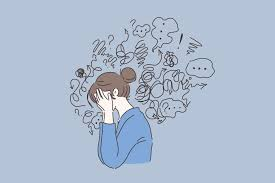Facing Depression: Strategies for Healing and Hope
Introduction
Depression is a pervasive mental health challenge that affects millions of people worldwide. While it can be an incredibly difficult condition to face, there is hope. This blog aims to provide insights and strategies to help individuals face and overcome depression.
Understanding Depression
Before we delve into strategies for confronting depression, it's important to understand what it is. Depression is not just feeling sad or down; it's a complex mental health disorder characterized by persistent feelings of sadness, hopelessness, and a loss of interest in activities once enjoyed. It can also lead to physical symptoms like changes in appetite and sleep patterns.
1. Seek Professional Help
Facing depression alone can be overwhelming and may exacerbate the condition. The first and most crucial step in confronting depression is to seek professional help. A mental health professional, such as a therapist or psychiatrist, can provide you with a diagnosis, treatment options, and support tailored to your specific needs.
2. Medication
In some cases, medication may be prescribed as part of the treatment plan. Antidepressant medications can help balance brain chemicals that play a role in depression. It's essential to take any prescribed medication as directed and communicate regularly with your healthcare provider about its effects and any side effects.
3. Therapy and Counseling
Therapy is a cornerstone of depression treatment. Cognitive-behavioral therapy (CBT), interpersonal therapy (IPT), and other therapeutic approaches can help you identify and change negative thought patterns, develop coping strategies, and improve your overall mental well-being.
4. Build a Support System
Don't underestimate the power of a strong support system. Reach out to friends and family members you trust and let them know what you're going through. Sharing your feelings with loved ones can provide emotional support and help alleviate the sense of isolation that often accompanies depression.
5. Self-Care
Self-care is a critical component of managing depression. Focus on activities that promote physical and mental well-being, such as regular exercise, a balanced diet, adequate sleep, and relaxation techniques like mindfulness or yoga.
6. Set Realistic Goals
Depression can make even simple tasks seem daunting. Break down your goals into smaller, achievable steps. Celebrate your successes, no matter how small they may seem.
7. Challenge Negative Thoughts
Depression often brings a barrage of negative thoughts and self-criticism. Learn to challenge these thoughts with positive affirmations and realistic perspectives. Cognitive-behavioral techniques taught in therapy can be especially helpful here.
8. Engage in Activities
Even when you don't feel like it, engage in activities you once enjoyed. Reconnecting with hobbies and interests can provide a sense of purpose and pleasure.
9. Avoid Alcohol and Substance Abuse
Alcohol and drug use can worsen depression symptoms. Avoid or limit these substances, and seek professional help if you struggle with addiction.
10. Be Patient with Yourself
Recovery from depression takes time. Be patient and compassionate with yourself throughout the process. It's normal to have setbacks, but keep moving forward.
Conclusion
Facing depression is undoubtedly challenging, but it's a challenge that can be overcome. By seeking professional help, building a support network, and practicing self-care, individuals can find their way towards healing and hope. Remember that you're not alone in this journey, and there is a path to a brighter future beyond depression.














0 Comments